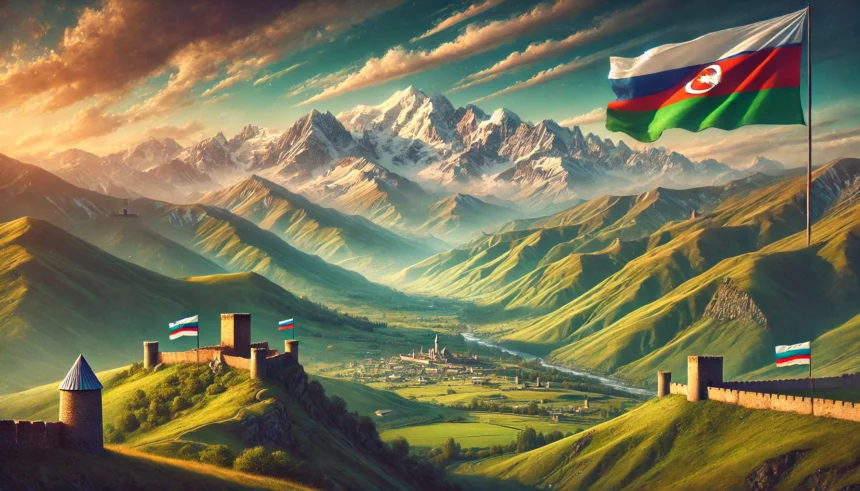Summary by Geopolist | Istanbul Center for Geopolitics:
Putin’s visit to Azerbaijan on August 18–19, 2024, was highly strategic and symbolic for Russia in the South Caucasus. Against this background, Moscow had been suffering from distress because of the war in Ukraine and the growing Western influence it faces in the region. The visit indicated that Russia will continue to make efforts to regain its position—especially when the West encircles Russia geopolitically.
The key details of the visit:
Reclaiming Russia’s Role in the South Caucasus:
In other words, Putin’s visit signals nothing more than the stubborn resolution not to abandon the South Caucasus territory after setbacks in Ukraine. He sends a clear message: Moscow is an influential player in the region. The visit falls within the framework of Russian interests to ensure the north-south corridor stretching from India through Iran and the Caucasus to Russia. The corridor is meant to be a wedge against the geopolitical encirclement that Russia faces, finding itself on the retreat from Western countries.
Making Turkey and Russia Balance:
A reception of Putin by the President of Azerbaijan, Ilham Aliyev, shows that Baku tries to maintain a strategic balance between Russia and Turkey with growing influence since the war in Karabakh in 2020. And Aliyev’s position indicates the fact that Azerbaijan does not want to come under Turkish influence. While having a friendly relationship with Turkey, Azerbaijan is now in search of measures to make its links more diversified by coming closer to Russia. An example of this balancing act has been Azerbaijan’s cautious reaction to Turkish President Recep Tayyip Erdoğan’s earlier comments about the Karabakh war, which left Baku unsettled.
Economic and Strategic Agreements:
Energy Cooperation: the two countries exchanged on the issues affecting the Russian-Azerbaijani gas blending mechanisms as well as its further delivery to the European markets. The latter could take in the establishment of an Azerbaijani energy company as a representative company of Gazprom or, otherwise, an upsurge in domestic Russian gas purchases with an uplift of exports. The hitch is that the Azerbaijanis have reservations on any pipeline capacity hike without long-term contracts in Europe. Transport Corridor: Putin spoke about the key significance of the north-south corridor if we are to talk in terms of transport connecting the Caspian Sea and the Indian Ocean through Iran and Azerbaijan. Aliyev stated that announcements were made about the infrastructure building very fast on the Azerbaijani side, including railway and highways, where the cargo capacity would be increased many times more. Tanker Production: Russia and Azerbaijan have signed a deal to cooperate in the construction of modern tankers designed for the transportation of oil and natural gas within and outside the Caspian and Black Seas. This venture will be carried out at the Baku Shipyard, which is a joint operation between Socar and Russian firms, to replace the old Soviet fleet.
Cultural and Political Relations:
The next stop in his itinerary was the Martyrs’ Lane and the grave of Heydar Aliyev, former president of Azerbaijan. The visit effectively underlined the cultural and historical ties between the two states. More so, it showed further that Moscow continues to have its own say in regard to the protection of the Russian Orthodox community living in Baku. Aliyev also said that it is important for Azerbaijan to learn the Russian language, with over 800,000 students, and for schools where Russian is the main language. The establishment of this cultural link further cements the political relations between the parties. The two countries signed several agreements and memorandums of understanding in various spheres, reflecting deepening economic links, with Russia playing a crucial role in trading. Bilateral trade between Russia and Azerbaijan went up by 17.8% last year and reached $4.3 billion.
Geopolitical Environment:
Armenia Drifts Away: Russia is also witnessing the reduction of its hold in Armenia, which—under Prime Minister Nikol Pashinyan—sways more toward the West, including U.S. and French military cooperation. As such, tensions between Moscow and Yerevan have emerged, with Pashinyan seeking an exit from the CSTO. The Nagorno-Karabakh Conflict: The visit illustrated Russia’s involvement in the process of reconciling Armenia and Azerbaijan. In the declaration, Putin also showed that he was ready to mediate discussions over unresolved disputes such as the demarcation of borders and the opening of transport corridors. On the other hand, there is an increase in tensions between Armenia and Russia; it has felt abandoned because Russia has not stood up for Armenia both in the 2020 and the present 2022 battles with Azerbaijan.
Effect on Regional Politics:
Azerbaijan is growing to be important as a neutral player in the South Caucasus, connecting strategic ties between both Russia and Turkey. The country’s balancing mediator of Russia and Turkey’s interests has by now turned into one of the major mediators for the preservation of stability in the region. This opens the vista that Putin’s visit to Azerbaijan is a signal: Russia will not take a single step back in the South Caucasus, even if the West attempts to reduce its influence. By cementing its ties with Baku, Moscow strives to preserve and strengthen its strategic foothold in a region where Turkey and the West have intensified their involvement.
Geopolitical Dynamics :
The visit has further outlined some of the broader geopolitics at play, namely that Azerbaijan might rise into the Shanghai Cooperation Organization or BRICS. What lays within the angles is Putin’s posture of support for Azerbaijan’s ambitions in this regard, as in most others; it seeks to provide assurance to its neocolonial projects like that of making newer alliances beyond the frontiers of the West. As such, the visit to Baku comprised a multi-layered diplomatic undertaking: the restoration of Russia’s importance in the South Caucasus; bringing back a balance on Turkey’s growing role in the region; boosting economic and political attachments to Azerbaijan; and, of course, underlining already strained relations with Armenia. This stands again as another reminder of a determined Russia set on safeguarding its important footing in the important region.
Read the full article here.







